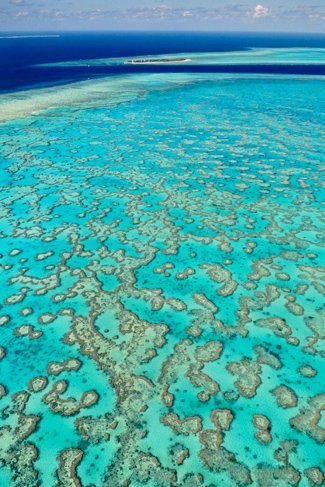Coral eroded from within as oceans warm

AS THE OCEANS WARM and acidify with climate change, coral reefs may be eaten away from within by microscopic organisms, a new study has found.
Scientists have found evidence that algae and other organisms that reside within dead coral will erode the skeleton at an increasing rate, as oceans continue to warm.
“They eat the coral from inside out, like honeycomb,” says Dr. Sophie Dove, one of the lead researchers.
Coral reefs are already in danger from human carbon emissions, which dissolve into the ocean and increase acidity – a process known as ocean acidification – causing reefs to develop at a slower rate.
As coral dies, it consolidates and acts as a platform for new coral to grow. The finding, published this week in the journal Global Change Biology, suggests that not only will future reefs have less material with which to regenerate, their support networks will be eroded more quickly by tiny organisms that bore holes into the coral skeleton.
Warm water will erode coral reefs faster
For the study, biologists from the ARC Centre of Excellence for Coral Reef Studies and the University of Queensland took coral samples from Heron Island, on the Great Barrier Reef. They placed these in tanks containing different seawater conditions.
One tank was based on the conditions of the ocean projected for the end of the century, if the level of carbon dioxide in the atmosphere is not reduced. In this instance, the rate of destruction almost doubled present-day rates.
The second environment projected future conditions if significant effort is made over the next decade to curb carbon dioxide emissions. In this tank, the destruction rate was 35 per cent higher than the present day.
“Our research shows that when seawater is both acidic and warm – which is predicted to happen under future climate scenarios – coral reefs could be made more fragile by microborers, such as algae, blue-green algae and fungi that inhabit reefs and bore tiny holes in it that undermine the strength of the coral skeleton,” says Sophie.
Sophie says that in both water conditions observed for the study, “the algae grew in number because they liked the warmer, more acidic conditions and greater availability of carbon dioxide.”
Reefs “bombarded by man-made threats”
The most abundant type of algae identified in the study is also the world’s most common photosynthetic microborer, which gets its energy from sunlight. It currently inhabits 85 per cent of the world’s corals and has an extraordinary ability to cope with low light conditions, allowing it to penetrate deep into coral skeletons.
Pat Hutchings, a scientist at the Australian Museum in Sydney, says the findings came as no surprise to her. “I have no doubt that what they’ve found out in the lab will be replicated out in the reef, although possibly at different rates.”
A mixture of factors can shift the balance towards faster destruction rates, including human involvement, she says.
“The reefs are being bombarded by a series of man-made threats and it’s happening too quickly for them to adapt or recover… The only way this can be changed is by reducing the overall amount of carbon dioxide.”
RELATED STORIES
Aussies unfit to care for Great Barrier Reef?
GALLERY: Top snorkelling spots in Australia
Great Barrier Reef has lost half its coral
Great Barrier Reef series reveals unseen events
Great Barrier Reef gest tested for flood damage
Pygmy sea horse and corals found at new depths
What do crocheted corals and maths have in common?
Deep-water corals adapt to low light
3-D maps reveal depths of the ocean floor
Coral spawning: a rare natural wonder
Sea cucumber poo to save Great Barrier Reef
Protecting the Coral Sea
Sawfish uses snout to detect and stab prey
10-year census finds thousands of marine species
Deepwater corals adapt to low light
Ningaloo revealed
Native fish swims 800km to find a mate
GALLERY: State of our oceans
Bigger fish groups make better decisions
Scientists eavesdrop on fish chatter
10 of the best shipwreck dives around Australia

